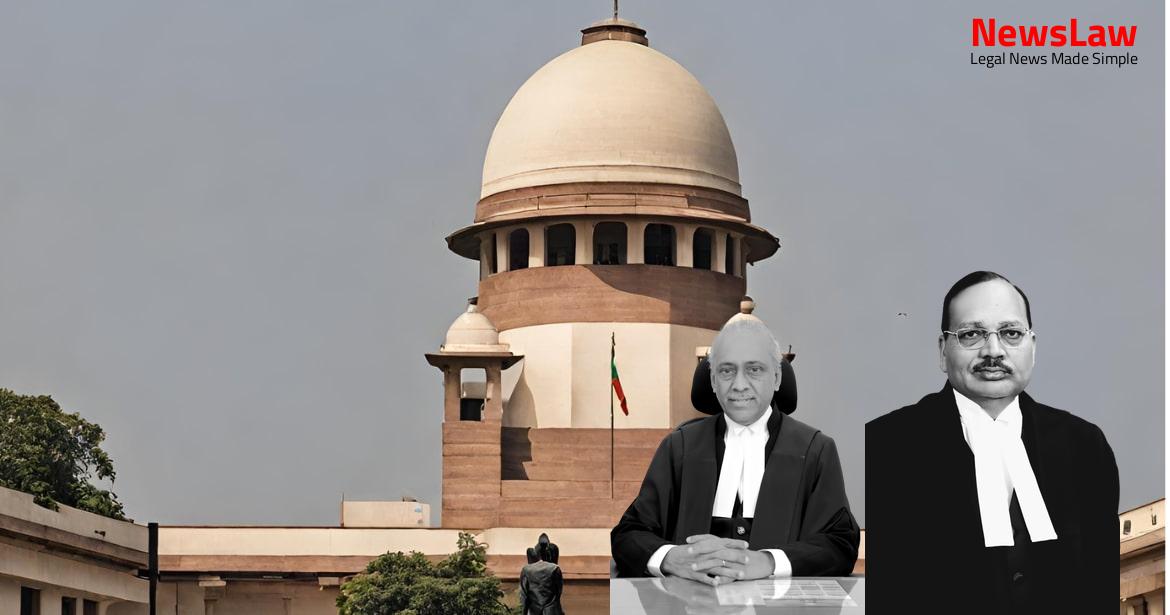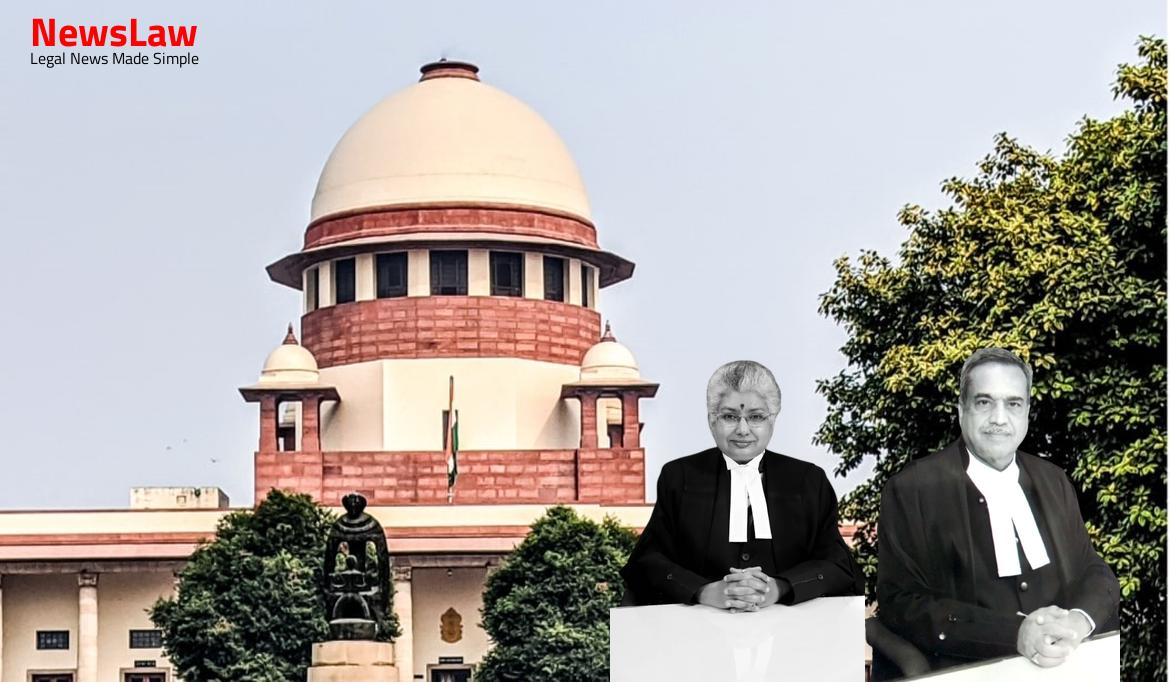In a significant legal battle, the Supreme Court of India delivered a judgment in the case of Yashita Sahu vs. Varun Varma concerning child custody and international jurisdiction. The case involves complex issues surrounding the custody of their minor child and disputes arising from the parents residing in different countries. Stay tuned for a detailed overview of the court’s decision and its implications.
Facts
- Yashita Sahu and Varun Varma got married in India on 30.05.2016.
- The parties share joint legal custody of their minor child.
- Parenting time is divided between the mother and father as per a schedule.
- The wife left the USA with the child and went to India, prompting legal actions by the husband.
- The husband filed for emergency relief in the Norfolk Court on 02.10.2019.
- Various orders were passed regarding residence, support payments, and custody arrangements.
- Both parties made allegations against each other, leading to a strained relationship.
- The wife sought protection orders and sole custody of the minor child from the court.
- Efforts were made for an amicable settlement with the help of a third party.
- The court issued orders for the wife to return to the USA and for passport surrender if a settlement was not reached.
- An arrest warrant was issued against the wife for violating court orders.
- The daughter, Kiyara Verma, was born to the couple on 03.05.2017.
- The husband was working in the USA during these legal proceedings.
- The High Court directed the wife to return to the USA within 6 weeks.
- The direction was given to allow the jurisdictional court in the USA to make further orders in the pending proceedings.
- The wife was also required to return with her minor daughter.
Also Read: Interpretation of Pre-deposit Requirement under SARFAESI Act
Arguments
- The wife approached the Court in Norfolk by agreement, obtaining shared parenting orders.
- The wife raised objections to the consent order through email.
- The appellant’s counsel argues that a writ of habeas corpus is not applicable as the child is with the mother, the natural guardian.
- The High Court directed the wife to travel to the USA, which is contested by the counsel.
- It is argued that the child, being a girl of 2 ½ years, requires the care and attention of the mother.
- The wife’s lack of English comprehension in the Norfolk Court is highlighted, leading to violation of court orders.
- The wife cannot seek protection in Indian courts after violating court orders in the USA where jurisdiction was invoked by her.
- The husband’s counsel contends that even a father can be an appropriate natural guardian for the minor daughter.
- Alternative stay arrangements were offered to the wife by the husband’s direction.
- The wife appeals against the High Court judgment, claiming the Norfolk Court order is not binding on her and in the child’s interest, the petition should have been dismissed.
- Concerns are raised about the husband’s work permit in the USA expiring in 2020, jeopardizing the future of the wife and child.
- The husband is willing to make all arrangements for stay and travel for the wife and child if they come to the USA.
- The husband is not interested in divorcing the wife and intends to live with both the child and the wife.
- It is established that a writ petition for habeas corpus can be maintained for the best interest of the child, as seen in cases like Elizabeth Dinshaw vs. Arvand M. Dinshaw, Nithya Anand Raghavan vs. State (NCT of Delhi), and Lahari Sakhamuri vs. Sobhan Kodali.
- The contention of the appellant-wife that the writ petition before the High Court of Rajasthan was not maintainable is rejected.
Also Read: Prabhakar Tewari vs Vikram Singh and Malkhan Singh
Analysis
- The concept of visitation rights is not fully developed in India, especially in cases involving parents in different countries.
- Courts must ensure that the parent denied custody has the right to communicate with the child regularly, considering the totality of facts in each case.
- The child’s best interest must be paramount, even if it means respecting orders of a court from another jurisdiction.
- The child’s right to love and affection from both parents must be upheld, even in cases of parental disputes.
- Clear definitions and specifics of visitation rights should be outlined by courts granting custody.
- Factors such as the child’s nationality, age, and welfare must be considered when deciding custody and visitation arrangements.
- Efforts should be made to maximize visitation rights between parents when they live in different locations.
- Parental disputes should not lead to the deprivation of care, affection, and protection for the child.
- The child’s education, social contact, and physical well-being should be a priority when determining custody and visitation.
- Respect for foreign court orders, especially in cases involving international custody disputes, is crucial.
- The child’s welfare should guide decisions on custody, visitation, and maintaining relationships with both parents.
- The wife filed a petition under Article 32 of the Constitution of India before the Court.
- The principle of comity of courts cannot be given primacy for deciding matters of custody or return of the child to the native state.
- The husband was given visitation rights and used them to pick up the child from school and bring him to India.
- Courts should decide custody based on the child’s best interest, potentially ordering return unless it harms the child.
- The court can decline the relief of return to the country from where the child was removed, even with a pre-existing foreign court order.
- An elaborate inquiry must consider the paramount interests and welfare of the child, weighing the foreign court order among other circumstances.
- The court in the country where the child was removed must answer the custody issue based on the child’s welfare.
- The petitioner may seek enforcement of the foreign court order or pursue custody through Indian court proceedings.
- In a habeas corpus petition, the High Court examines if the minor is in lawful custody.
- Decisions on child custody must prioritize the child’s welfare above legal rights, considering all aspects contributing to the child’s well-being.
- The child’s welfare is the paramount consideration in custody cases, with a focus on stability, security, care, and full development.
- The conduct of the father raised doubts about his suitability for custody and guardianship.
- Courts handling child custody cases involving international removal must carefully weigh all circumstances and the child’s welfare.
- The child was ordered to return to the United States for education under the custody of the mother, entrusted by a US court.
- The child’s best interests indicated a return to the US, where they had spent most of their life and were thriving.
- No direction can force the adult wife to live in another country, even in matters related to child custody.
- Jurisdictional challenges arise when adults move between countries after marriage, and cases must be decided on individual merits.
- Decisions on child custody should prioritize the child’s welfare, potentially involving an investigation in the child’s native country for their best interest.
- The husband shall purchase tickets for travel of the wife and the minor child to USA by 20.02.2020.
- The wife is responsible for obtaining the necessary travel documents for the journey.
- The husband will take care of all expenses for the day to day running of the house, medical insurance for the wife and child, electricity, gas, and other incidental expenses until the US Court makes a provision.
- If the wife decides not to stay with the husband for personal reasons, he will arrange for alternative accommodation.
- The husband is directed to cover expenses for house running, medical insurance, and other incidental expenses until the US Court makes a provision.
- The husband shall not take any coercive actions against the wife in the USA.
- The husband agrees to bear all expenses for the education of the minor child in the US, including nursery school fees, which amount to approximately US $1000-$1500 per month excluding meals and school supplies.
- Mr. Rajkotia, counsel for the appellant-wife, argued that the situation would significantly differ if the husband’s work permit/visa is not renewed.
- The outcome of the case could be influenced by the husband’s visa status.
- There is a possibility that the direction of the judgment may change if the husband’s work permit is not extended.
Also Read: Infinity Infotech Parks Ltd. v. Actual Names: Electricity Restoration Order
Decision
- The husband is directed to pay US $250 per week to the wife for her personal expenses in the USA until 30.04.2020 or until the jurisdictional court in the USA passes orders.
- This amount is in addition to the US $200 per week that the husband has agreed to pay for the maintenance of the minor child.
- If the wife does not inform the husband’s counsel within one week of her willingness to return to the USA, it will be assumed that she does not intend to go back with the child.
- In such a case, the wife shall hand over custody of the minor to the husband or his mother if the husband cannot travel to India.
- Any pending legal proceedings initiated by the husband shall be withdrawn if the wife chooses not to return to the USA.
- The arrangement for custody will only be valid until 30.04.2020, after which proper directions from the jurisdictional court in the USA must be obtained.
- The husband undertakes to make arrangements for the stay and travel expenses of the wife and child in their two-bedroom apartment in the USA, for which he pays a rental of US $1500 per month.
- If the husband’s visa or work permit is not extended, the wife can approach the court for further directions, indicating uncertainty about the husband’s stay in the USA.
Case Title: YASHITA SAHU Vs. THE STATE OF RAJASTHAN (2020 INSC 58)
Case Number: Crl.A. No.-000127-000127 / 2020



